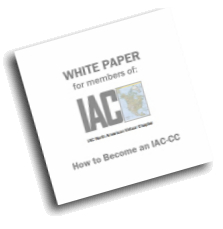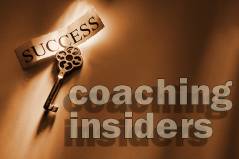 A major right of passage for any professional coach is getting your very first paid coaching client.
A major right of passage for any professional coach is getting your very first paid coaching client.
Some coaches feel a little anxious until they get their first client, especially if it doesn't happen quickly. But it doesn't have to be that way. My first client volunteered to work with me. In so doing, he inspired me to attract several new clients in my first year of coaching by following the following simple rules. It can be this easy for you, too. These principles can help you stop chasing and let your clients find you, instead.
Your 1st steps are really about setting the foundation for your coaching success. It's almost impossible to show up as a great coach if doubt, fear and anxiety are causing you to feel a little desperate. Here are several things you can do to make the whole process easy as silk and still maintain your enthusiasm.
1. Develop crystal clear goals. Both short term and long term goals need to be clarified. And you might be interested to know that according to the Wall Street Journal, the single variable that is most likely to predict how profitable a business will be is how big the original goal was. Just be sure you have a plan and can see how you will fulfill your really big goals. In the meantime, have smaller, doable goals, so you know you're on track. My 1st year goal for my coaching business was to break even each month, so that my coaching income at least equaled what I was paying for coach training and for my mentor coach. I achieved it. My 2nd year goal was to pay myself back for everything I had invested upfront in my coaching business, so I could make a genuine profit. I achieved that too. By the beginning of my 3rd year, I had a full coaching practice and what I was earning was virtually all profit. Sane goals like these will keep you on track while you're creating the business of your dreams.
2. Simplify everything, including your life and your business. Relationships, jobs, family, volunteer work, etc. can all derail your business plans, if you're not careful. Beware the 'Super Coach' mentality that says you just have to do it all. Nobody can do it all. Since in the beginning, filling your coaching business takes more energy than merely keeping it full, and since early on is when your coach marketing skills are likely at their weakest, plan on putting in lots of hours and energy into your business at least for the first year or two until it's full, with a waiting list, and you have a reliable marketing engine. That may mean learning to say, 'No', a lot more often. Resign from demanding volunteer positions. Explain to the kids that you may miss a soccer game or two. Delegate at work. If coaching is your calling, you owe it to yourself and the world to clear the decks to get your business set up successfully.
3. Make sure all stake holders are on the same page. Speaking of family, friends, etc. Guilt can make building your coaching business more challenging. But your loved ones can also assist you and make it easier. Rather than feel bad that you're not doing as much for everyone else, use your coaching skills to fully communicate what you're really up to. When you share your inspiration and how much this means to you with them, the people who care most about you will whole-heartedly join your team and they may even help you find clients. This is different than trying to convince someone of the value of coaching, by the way. See #6 in tomorrow's post.
4. Get the money handled. When you know you have enough money coming in already, you can afford to trust the process of attracting clients. Starting a business is not like starting a new job. You won't get a paycheck in two weeks. But your time investment will payoff handsomely, if you go the distance. This is a good time to simplify your financial life, along with everything else. Reduce debts by negotiating for lower interest rates. Stop paying for things you aren't using. If you're not confident you have enough money coming in already, consider getting a part-time job. Some of the most successful coaches I've known took service jobs before they became successful. That way, they could focus on what they wanted to create instead of worrying about the money.
5. Tell everybody what you're up to. This is technically known as marketing, a.k.a. telling people how you can help. In your first year of coaching, even if your coaching skills aren't fully honed, yet, share your excitement and inspiration about coaching with pretty much everybody. Don't be attached to getting them to understand coaching the way you do. They probably won't. Do share your energy. That's naturally attractive and even contagious. My first client volunteered to work with me (and paid me) because I shared my excitement with him about what coaching can do. That's all it took! And he continued coaching with me for 7 years. You don't need to convince people that you can help them. Convincing never works. See below.
Come back tomorrow for the last five secrets of finding your first coaching clients.
Are the first five secrets helpful to you? Do you have secrets of your own to share with other coaches? Please post them in the comments section.

Download the free Coach 100 eBook for more ideas on how to find your first coaching clients.






 One of the many hurdles that a new coach might struggle with is getting up that first website.
One of the many hurdles that a new coach might struggle with is getting up that first website.







 I've asked a lot of coaches why they came into this profession and almost all of them say the same thing: I love helping people.
I've asked a lot of coaches why they came into this profession and almost all of them say the same thing: I love helping people. 
